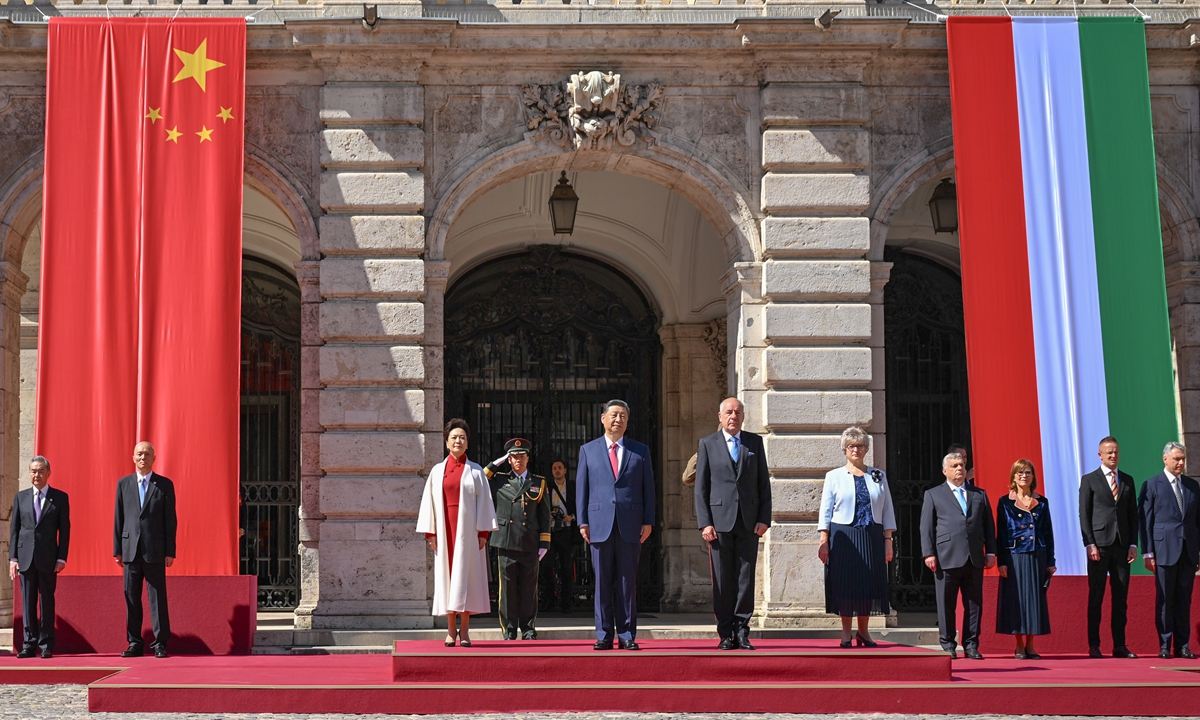
Chinese President Xi Jinping attends a welcome ceremony jointly held by Hungarian President Tamas Sulyok and Prime Minister Viktor Orban in Budapest, Hungary, on May 9, 2024 Photo: Xinhua
China and Hungary decided Thursday to elevate bilateral relations to all-weather comprehensive strategic partnership in the new era during Chinese President Xi Jinping's visit to this Central and Eastern European country, which experts say is a result of fruitful cooperation between the two sides and carries significance to China-Europe relations.
The announcement was made after Xi held talks with Hungarian Prime Minister Viktor Orban. They jointly witnessed exchange of cooperation documents and met with the press.
The China-Hungary relationship is now at its best in history, Xi said earlier on Thursday when meeting with Hungarian President Tamas Sulyok at the Sandor Palace in Budapest.
The bilateral relationship has stood the test of the changing international landscape and continued to grow in depth from a friendship across the continent to a friendly and cooperative partnership and then to a comprehensive strategic partnership, Xi said.
Xi arrived in Budapest on Wednesday, on the last leg of his three-nation European trip. Xi previously visited Hungary 15 years ago.
He was warmly welcomed by Orban and his wife at Budapest Airport upon arrival. The Hungarian Air Force sent fighter jets to escort Xi's plane after it entered the country's airspace.
Ju Weiwei, deputy director of the Central and Eastern Europe Office, Institute of European Studies of the Chinese Academy of Social Sciences, told the Global Times on Thursday that elevate bilateral relations to all-weather comprehensive strategic partnership in the new era is a big achievement of bilateral relations and is a result of fruitful cooperation between China and Hungary in all aspects such as infrastructure, investment and culture as well as respect for each other's core interests and the solid basis of public opinion in both countries.
"This has positive significance to future China-Europe relations and cooperation between China and Central and Eastern Europe," said Ju.
Both Chinese and Hungarian experts believe mutual respect and a cooperative approach with no ideological strings attached have played decisive roles in bilateral relations.
This year marks the 75th anniversary of the establishment of China-Hungary diplomatic relations. Hungary was one of the first countries in the world to establish official relations with China.
Hungarian Foreign Minister Peter Szijjarto said in a recent interview with the Global Times that it's a great honor that the two countries celebrate the 75th anniversary of establishment of diplomatic ties with a presidential visit. He believes that this is positive feedback showing that China and Hungary are on the right track and this is very important to Hungary.
Mutual respectSince the establishment of their diplomatic ties, China and Hungary have always respected each other, treated each other as equals, and pursued mutual benefit, Xi said when meeting with the Hungarian president.
Szijjarto told the Global Times that mutual respect, which is currently missing in international politics, is a really strong and stable basis for the successful cooperation between China and Hungary.
Over the years, China-Hungary cooperation has been developing in a steady manner. In 2015, Hungary became the first European country to join the China-proposed Belt and Road Initiative. In 2017, the bilateral relationship was elevated to a comprehensive strategic partnership. The Hungary-Serbia railway that is under construction is the flagship project of the BRI in Central and Eastern Europe.
On world affairs, China and Hungary often share similar stances. Despite being an EU member state and a NATO member, Hungary has remained committed to not sending any weapons to Ukraine.
Levente Horvath, director of the Eurasia Center of John von Neumann University and chief advisor to the governor of the Central Bank of Hungary, told the Global Times that the relationship between Hungary and China is getting increasingly close because they think similarly about international relations.
"Hungary seeks cooperation with countries based on its own national interests. It recognizes that pragmatic cooperation can bring promising prospects while confrontation and sanctions can only bring lose-lose scenarios and be exploited by those with ulterior motives," Ju told the Global Times.
Bridge linking East and WestIn 2010, Hungary began implementing the "Opening to the East" policy, underlining the fact that the wind is blowing from the East in the world economy.
In recent years, Hungary has become a major logistics hub for China-Europe trade. Hungary is also Europe's electric vehicle hub ─ Chinese EV maker BYD announced in late 2023 that it will build its first European electric vehicle production base in Hungary and the plant will produce EVs and plug-in hybrids for the Europe market.
Hungary's connectivity strategy makes it a key country to connect West and East. Experts also believe that Hungary can play a facilitating role in bridging China and Europe.
On several occasions, Hungary has stood aside from or opposed EU positions against China. For instance, in 2021, Hungary blocked an EU statement criticizing China's National Security Law for Hong Kong.
"Hungary is special among the EU. It does not oppose the bloc every time when it comes to China-related issues, but it has played a special role in China-Europe relations. Hungary is a partner China should seriously cooperate with," Sun Keqin, a research fellow at the China Institutes of Contemporary International Relations, told the Global Times.
On July 1, Hungary will take over the rotating presidency of the Council of the EU. Foreign Minister Szijjarto believes Hungary can use the opportunity to influence the EU's policy toward China.
"We will be able to share with our European colleagues in a very credible manner how helpful, how useful and how profitable it can be to work together with China," Szijjarto told the Global Times in the interview.




